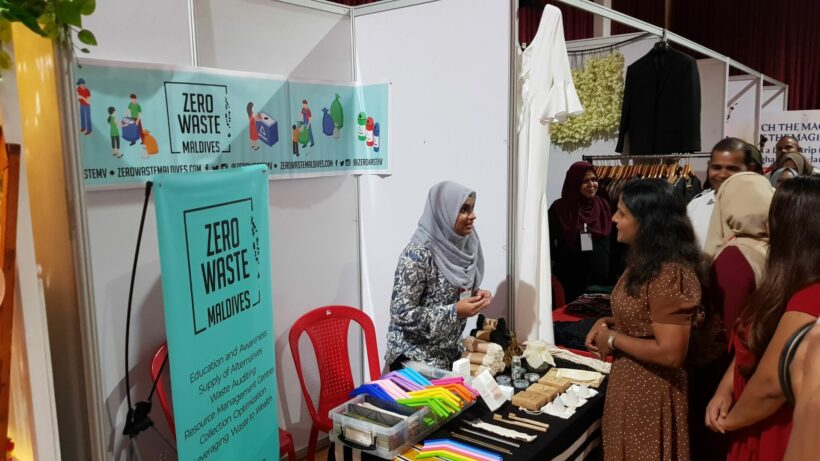Mariyam Hamsha Hussain: Architect, environmental advocate, and feminist
by Johanna Poblete
 Mariyam Hamsha Hussain was “that kid who represented the environment club” in primary school. Now a professional architect with a degree from RMIT University in Australia, Hamsha remains as passionate about the environment as ever. Returning home to Maldives in 2015, she co-founded Zero Waste Maldives together with her husband Ahmed Afrah Ismail. Their aim: to minimize the amount of pollution inter-island and turn waste into wealth.
Mariyam Hamsha Hussain was “that kid who represented the environment club” in primary school. Now a professional architect with a degree from RMIT University in Australia, Hamsha remains as passionate about the environment as ever. Returning home to Maldives in 2015, she co-founded Zero Waste Maldives together with her husband Ahmed Afrah Ismail. Their aim: to minimize the amount of pollution inter-island and turn waste into wealth.
The Maldives generates more than 860 metric tonnes of waste — the majority plastic — daily, according to the World Bank. Poor waste management has been threatening the archipelago’s marine ecosystem as well as its status as a premier tourist destination, visited by more than a million tourists annually. Plastic bags, plastic bottles, garments, and more recently, face masks, are but a few of what makes up the mountains of rubbish collected by island waste management centers or seen floating on Maldivian shores.
Hamsha and her husband Afrah, who worked for the Environmental Protection Agency when they were starting out, saw firsthand the waste situation in the inhabited islands of the Maldives. Implementing interventions in the waste stream as Zero Waste Maldives co-founders have also prompted Hamsha to reimagine solutions — even for her profession.
Hamsha’s firm recently participated in an architectural design competition and entered an energy-efficient and sustainable building design, and she surmised that perhaps recycled plastic, or even construction waste often used to counter soil erosion on beaches, could be repurposed and reused as construction blocks.
“We are still in an experimental phase, so I hope we can do it,” she said.
Eco-friendly alternatives
Hamsha channels her drive to experiment and seek eco-friendly alternatives through Zero Waste Maldives, which started out as a social enterprise in 2018 and registered as an NGO in 2019. “If we don’t get funding from any other way, we still have our business that would fund our projects. It’s helping to achieve what we wanted to do,” explained Hamsha.
From the outset, the co-founders visited Zero Waste management centers to study how the systems worked. They also took it upon themselves to collect trash from the beach. It gave them ideas of what to sell on the business end of Zero Waste Maldives. “What are the most used products here and what are the alternatives for that? That’s how we decided on the products,” said Hamsha.
Today, Zero Waste Maldives has sold everything from bamboo toothbrushes (phasing out plastic toothbrushes) to menstrual cups (minimizing disposables). In addition to the latter, Zero Waste Maldives partnered with the United Nations Population Fund (UNFPA) to educate women on the reproductive cycle, reproductive health, and the use of sustainable menstrual products. They have since distributed more than 700 menstrual cups. More importantly, their initiative enabled women to be more comfortable with their bodies and to talk freely about menstruation. Together with UNFPA, Zero Waste Maldives will also be publishing a book about menstruation, written in their local language.
“The main reason for the project is to break the taboo surrounding menstruation and reproductive health by raising awareness on the subject. If we are not comfortable talking about our reproductive health, how are we supposed to know the problems that we face?” said Hamsha.
Hamsha enjoys working with the women in the communities, as it speaks to the agency of women — that women are capable of being change-makers — and teaches them to be more accepting of their bodily autonomy. As it turns out, women are also instrumental in shifting attitudes about waste — either via the power of the purse, being charged with shopping, and waste disposal at home.
“Many women have asked me, ‘Why does it have to be us, women who have to work on reducing waste? Why does it have to be women that have to change their behavior — why is it just us who have to do that?’ I understand the eco-gender gap and mostly it is women who are empathetic toward climate change. We have more power at home and at our workplaces to lead with these changes. We are slowly breaking this patriarchal society,” said Hamsha.
Zero Waste Maldives advocates that a circular economy cannot be composed only of women, nor does it hinge on individual lifestyle choices — it must be a community-based and collective effort. “I think Zero Waste would bring the community together, it would be a very community-based operation, everyone helping to reduce waste and people being more responsible. I would like to see that kind of community in Maldives,” said Hamsha.
Their waste-to-wealth intervention specifically, “Fehi Fathi,” is designed to empower women to be self-sufficient. The co-creation of a waste-to-wealth business around fabric waste helps to financially support the island’s women’s development committees which are largely underfunded and underappreciated.
Teaching responsibility
Zero Waste Maldives started out by tackling the waste problem on the collection front, piloting a Deposit Refund Scheme (DRS) that offered a financial incentive to encourage the return and proper disposal of used plastic bottles. Funding was provided through the United Nations Development Programme’s (UNDP) Urban Innovation Challenge. By providing a one-rufiyaa-per-bottle reward, they achieved an 81% return rate in the pilot city. The collected plastic waste was then recycled through Parley Maldives. From the lessons learned during this small pilot project, Zero Waste Maldives with Adelphi Germany has been selected through UNDP’s Ocean Innovation Challenge to create the legal framework that will help implement Extended Producer Responsibility (EPR) in the Maldives.
Given that tourist-heavy Maldives generates more than 280,000 plastic bottles daily, an EPR scheme is vital to waste reduction. As islands are reclaimed to create waste management facilities, collecting and transporting waste becomes a logistical challenge, and the waste ends up being buried in a landfill or incinerated. “We just can’t keep collecting and accumulating waste. Having an EPR policy and EPR system here would help reduce the waste that we are producing, put pressure on producers for upstream changes to production and reduce the pressure on the waste management system,” said Hamsha.
Taking lessons from how successful EPR systems are implemented regionally, Zero Waste Maldives is now espousing a Mandatory Packaging Reporting Scheme based on the Singaporean model, which will create a comprehensive and reliable database on packaging waste prior to the establishment of a national EPR scheme. They are currently working with Adelphi consult GmbH and the Government of the Maldives to develop this framework.
Moreover, Zero Waste Maldives has managed to lobby the government and parliament to get provisions for EPR included in the draft of the proposed National Waste Act. They suggested changes — including the removal of a clause on the importation of waste for a planned waste-to-energy project — which is currently under discussion. “It’s in the works right now. Once the Act comes out, and it would complement the new EPR that we are making, then we will be able to go forward with the EPR implementation. Maybe two, three years down the line, we will have [a national] EPR system,” said Hamsha.
When Hamsha and Afrah started Zero Waste Maldives, it was somewhat of a family enterprise, with the two of them tapping extended family as volunteers. Now they are in need of more volunteers to work on their many projects, from anti-incineration campaigning to promoting the drinking of tap water to combat plastic water bottle consumption (Fenveshi, a project with the Canada Fund for Local Initiatives or CFLI), to rescuing and upcycling clothing to reduce garment waste in landfills (FehiFathi or Green Stitch). “We are still searching [for members who will be just as passionate about Zero Waste] and hopefully we will have [a branch] in every island or in every atoll — that’s the hope,” said Hamsha.
Zero Waste Maldives collaborates with multilateral organizations as well as other NGOs, local communities, and the government. Their work with the environment ministry and the President’s Office even earned them a seat at the table discussing the upcoming National Waste Act.
“Initially we were just only thinking of providing alternatives for the products that are single-use plastic. I didn’t think we’d have this many projects and we’d be involved this much,” said Hamsha, noting that they were able to do good work despite the pandemic. “It takes a while to see the results of our projects, the work that we put into society. It would take time to see some desired outcomes. But I think that we are doing really well,” she said.






